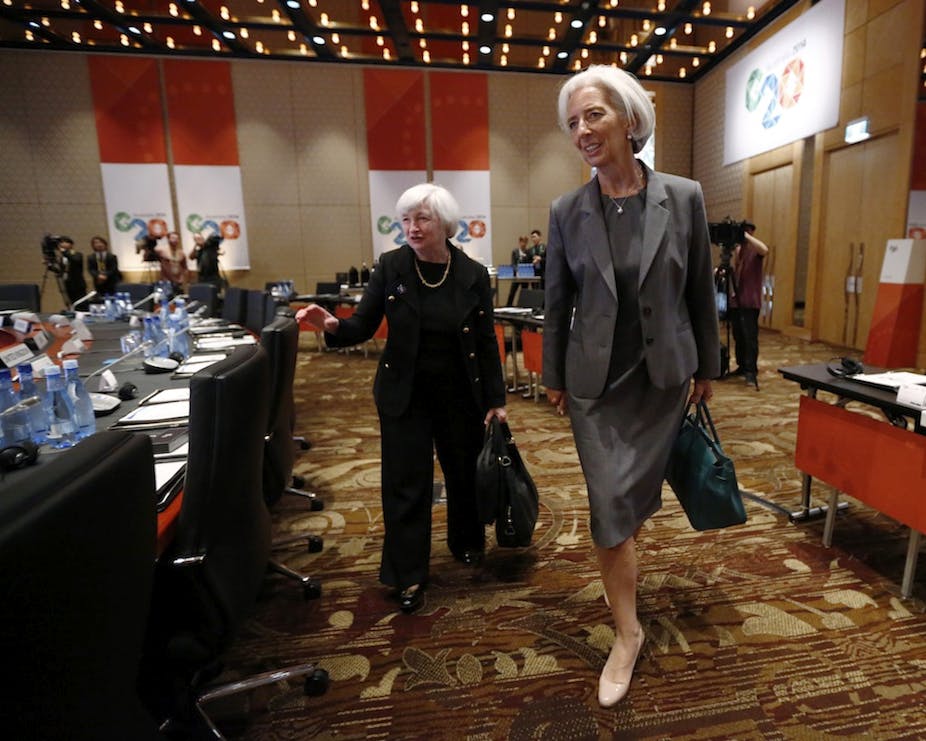IMF chief Christine Lagarde left Sydney commenting that the “two genders” will have to contribute if the G20 was to achieve its aim of lifting economic growth targets by 2%.
Critiques of that growth target have ranged over whether it is achievable or not new to suggestions for growth with strategic add-ons - social inclusion, environmental protections and/or climate-mitigation strategies, or growth with decent work.
But even if you just “go for growth”, every which way but loose, Lagarde is dead right. If the G20 is serious about “sustainable and balanced growth” as the “premier forum for international economic cooperation”, then it needs to demonstrate its serious intent towards matters of gender equality.
Despite a promising paragraph in the Los Cabos Leaders Declaration and several references to health and education over the years, the G20 has been seriously deficient in its recognition of gender issues in the global economy, despite the clear evidence base for such issue in terms of productivity and every facet of the G20’s focus.
G20 Leaders Declaration, Los Cabos 2012 said:
We commit to take concrete actions to overcome the barriers hindering women’s full economic and social participation and to expand economic opportunities for women in G20 economies. We also express our firm commitment to advance gender equality in all areas, including skills training, wages and salaries, treatment in the workplace, and responsibilities in care-giving.
But what has actually happened? Economic policies and institutions still mostly fail to take gender disparities into account, from tax and budget systems to trade regimes. Evidence of the gendered impact of austerity measures is still emerging from Greece and Spain, including the high representation of female public sector employees laid off and the mass closure of domestic violence refuges.
That the political economy of violence against women impacts on national productivity and health systems is well-known. KPMG estimated in 2009 that such violence costs Australia $13.6 billion each year.
But evidence of the impact that including women could make to growth of the formal economy seems to be routinely ignored. Even when it comes out of the World Economic Forum, not known for its feminist leanings. The Forum now publishes the Global Gender Gap Index and regularly identifies gender inequality as a substantial risk to economic growth and stability in its annual risk survey.
Partly this is because of the under-representation of women in G20 processes. Only 25% of the heads of state of the G20 member countries are currently women. The figure for finance ministers, central bank governors and sherpas is even lower, with only 15% women.
The official Sydney photo of finance ministers and central bank governors shows 10% representation:

Advocacy campaigns using data to model gender gaps in G20 countries and the Third Billion campaign are beginning to add some pressure to leaders. Some countries are responding at the rhetorical level, most notably prime minister Shinzo Abe stating that empowering women is a key pillar of his ‘Abenomics’ agenda, because “women are Japan’s most under-used resource”.
One positive area of progress has been in recognising the importance of financial inclusion - the concept of ensuring the poor or marginalised can access financial services. At a rhetorical level at least, the G20 has recognised the benefits of financial inclusion to economic growth and poverty reduction with the successive endorsement of high level principles, action plans and the establishment of the Global Partnership for Financial Inclusion (GPFI) and the Women’s Finance hub.
These various principles refer to the importance of “addressing vulnerable groups’” needs for protection and education. In 2012 G20 Leaders asked for a report on how women and youth could gain access to financial services and financial education. This links to UN discussions about what comes after the Millennium Development Goals which end in 2015. The High level Panel identified a key principle of “leave no one behind”.
So what are G20 countries going to actually do with all these high level principles? The next GPFI meeting will be in Hobart in May, and civil society groups are urging policy makers to ensure national financial inclusion strategies and targets address a full range of financial services (savings, credit, insurance and payments) and monitor the progress made towards including groups like the poor, older adults, persons with disabilities, youth, women, rural households, migrants, refugees, subsistence farmers, and the LGBT community. Focusing on protecting the vulnerable is one thing, but promoting women’s economic agency would be a better strategy.
The G20 needs a seminal moment on this issue - as the Security Council had in 2000 with the emergence of the Women Peace and Security agenda - and one that sees women as agents in the economy. A nascent G20 discussion on “inclusive” growth, the financial inclusion agenda and investing in gender equality measures for employment needs to accelerate. Leaders of G20 countries need to demonstrate awareness of, and accountability for, the gendered consequences of their decisions. Then we would be truly be going for growth.

